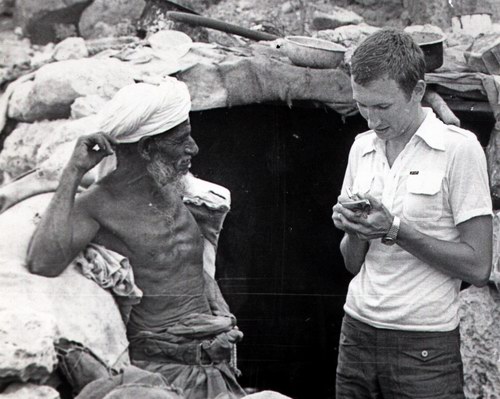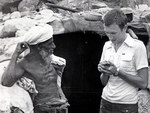Socotra Fairy-tales
Island of Fairy Tales

Two men loved each other - because the men were brothers. One day one of them said to the other: - Brother, do you know what will separate us? - What? - the other said. - Woman's work,- the first said. - Woman's work? It's impossible!- his brother said." Fatima Salim, who is telling me this oldest tale, doesn't stop sewing and the voice of her sewing machine accompanies the story. Fatima, who never went to school in her life, is sitting on the entrance of her family's cave. She doesn't know that a story like this one - about the two brothers and the dishonest wife of one of them - was once recorded in ancient Egypt over 3000 years ago for the Crown Prince Seti and is kept now as a great value in the Papiry collection of the British Museum.
In Soqotran fairy tales you can also find elements and themes similar to European ( French, German, etc.) and Russian folk-lore tales that disclose their very old mutual ecumenical ground.
In the same time the Soqotran version of "Cinderella" (there are at least two versions of this tale on the island) or "The Story of the Brother and the Sister" ( which greatly reminds me of the popular Russian "The Sister Aljonushka and the Brother Ivanushka" folk tale) are full of local exotic details and original and rich subject lines that makes them very attractive. We feel that this is a sort of ancient oral pre-literate "literature" which must be saved along with its environmental context in which it still exists. And Soqotrans themselves, adults and children at schools, could help very much in collecting and promoting of this remarkable heritage.
The role the Soqotran folk-lore tales played for hundreds of years in the island society and play now is very important. They contribute a lot in early childhood traditional language and behaviour education and form a basis for the unique peaceful nature of Soqotran people. They also develop imagination and thinking skills among the Soqotran children (the Russian versions of some Soqotran folk tales made by the author help now to develop the same skills damaged by TV and computer-plays among Russian children with perceptible success). That’s why this oral literature also can be used in the frame of innovative environmental education that may help to achieve stable balance between the conservation of Soqotra's natural environmet and forthcoming development of the island in the 21st century. Its own ancient heritage can help Soqotra to stay a fairy tale island in the era of modernisation.
Vladimir Agafonov, Moscow
Newsletter "Tayf" No 2 - July 2005
This Soqotran tale was recorded from Fatima Salim Sho'o (ca. 19) near her family small cave at Mauna Mountain in the north-western Muri area of Soqotra island just near the airfield and the camp in 1980. Her father Salim ‘Abdella Sho'o, her mother Maryam Keshen, and both of her brothers Sa’id and Sa’ad were also there. Fatima, a young clever Bedouin woman, never went to school. Here is a beginning of the tale which is very close to the famous Egyptian tale of Two Brothers from the d'Orbiney papirus.
One day Ali the Clever One was wondering. And he was wondering if he is not as good as other people? Other people who came to the Sultan, gave him good presents. But he, Ali, surely he was also good so he decided to treat the Sultan.
One day Ali the Clever One decided to try his hand at agriculture. He found a piece of land, cleared it of stones and brush-wood, dug the earth and made a kitchen garden. After a little time his kitchen garden began to grow, now he had only to water it and to wait for a harvest. But that didn’t happen.
One night a young fellow slept and had a dream that he married a Sultan's daughter. In the morning he told his friends about the dream, they told their friends about the dream and finally the Sultan knew about the dream. The Sultan became very angry. "Take him to jail!" he ordered his servants and they carried out his order immediately...
There were two friends. One day one of them said: “Hey, brother! Do you want (us) to go for a walk?! To that place on this plain?!” “Yes, I do”, this friend said. They went. When they went the strong wind came and the whole place disappeared...
Once upon a time there was a girl. Her parents died when she was very small so she went to stay with an old man and his wife who would look after her. The old man was a fisherman, but his catch of fish was small - just enough for them not to die from hunger. His wife was very angry, aggressive and very noisy. The girl lived with them but was worried because the old man and his wife didn't love her and that is why she was named Mehazelo, the unloved, by the neighbours.



